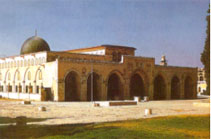The Life of Prophet Muhammad PART II In Al-Madinah | ||||
The Jews and Hypocrites
In the first year of his reign at Yathrib the Prophet made a solemn treaty with the Jewish tribes, which secured to them equal rights of citizenship and full religious liberty in return for their support of the new state. But their idea of a Prophet was one who would give them dominion, not one who made the Jews who followed him brothers of every Arab who might happen to believe as they did. When they found that they could not use the Prophet for their own ends, they tried to shake his faith in his Mission and to seduce his followers, behavior in which they were encouraged secretly by some professing Muslims who considered they had reason to resent the Prophet’s coming, since it robbed them of their local influence. In the Madinah’s surahs there is frequent mention of these Jews and Hypocrites. The Qiblah Till then the Qiblah (the place toward which the Muslims turn their face in prayer) had been Jerusalem . The Jews imagined that the choice implied a leaning toward Judaism and that the Prophet stood in need of their instruction. He received command to change the Qiblah from Jerusalem to the Ka‘bah at Makkah. The whole first part of juz’ 2, part of Surah II, relates to this Jewish controversy. The First Expeditions The Prophet’s first concern as ruler was to establish public worship and lay down the constitution of the State: but he did not forget that Quraysh had sworn to make an end of his religion, nor that he had received command to fight against them till they ceased from persecution. After he had been twelve months in Yathrib several small expeditions went out, led either by the Prophet himself or some other of the fugitives from Makkah for the purpose of reconnoitering and of dissuading other tribes from siding with Quraysh. These are generally represented as warlike but, considering their weakness and the fact that they did not result in fighting; they can hardly have been that, though it is certain that they went out ready to resist attack. It is noteworthy that in those expeditions only fugitives from Makkah were employed, never natives of Yathrib; the reason being (if we accept Ibn Khaldun’s theory, and there is no other explanation) that the command to wage war had been revealed to the Prophet at Makkah after the Yathrib men had sworn their oath of allegiance at al-‘Aqabah, and in their absence. Their oath foresaw fighting in mere defense not fighting in the field. Blood was shed and booty taken in only one of those early expeditions, and then it was against the Prophet’s orders. One purpose of those expeditions may have been to accustom the Makkah Muslims to going out in war like trim. For thirteen years they had been strict pacifists, and it is clear, from several passages of the Qur’an, that many of them, including, it may be, the Prophet himself, hated the idea of fighting even in self-defense and had to be inured to it. |
Sunday, March 15, 2009
The Life of Prophet Muhammad(part 2)
Subscribe to:
Post Comments (Atom)


No comments:
Post a Comment